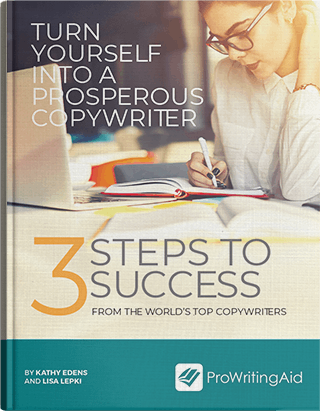
Feast or famine.
If you talk to anybody about freelancing or writing for a living, that phrase is going to come up in the conversation. I can tell you that this is undoubtedly true: the feast or famine cycle of writing is real.
A handful of years ago, I made six figures a year. Then one year, my income cut in half. Then the next year, it cut in half again. It bottomed out when my taxable income for one year was around $8,000.
For the year.
I'm back up at the top of that roller coaster once again, soaring to new highs as I rack up retaining fees and quality clients. I'm having fun and making money for myself and my family. It's a great feeling.
But even as my wife and I sit down and work up the monthly budget, discussing how things are going, there's always a subtext in the conversation: what happens when things go south again?
A tale of two professions
When I am doing well, it's super easy to brag about my job.
The pros (which we'll get to in a minute) are basically everything that anyone would want from their career.
"It must be nice" is often said in response when they ask what I do.
And they're right. It is nice.
When things aren't so hot and money is hard to come by? Suddenly those pros get outweighed by a whole bunch of cons. And those cons make it really easy for someone to shrug off my career and mutter, "I could never do that."
And, well, they're right, too.
Writing is both a really, really nice job that I am blessed to have, and it's also a really, really tough job that breaks a person down and tests their resolve.
I'm not writing this today to convince you to be a writer. I also am not writing this to scare you away from being a writer. I don't know you, your family, your needs, your finances, or even your writing ability.
My goal here is to present a factual, reality-based picture of what it's like to be a writer for a living. You can do with it what you want. If you see the cons and decide that the pros are worth it, come on in to the pool of professional writers. The water's fine, and there's plenty of room for you.
But if you see the cons and decide there's no way you would take on that kind of risk and responsibility, I tip my hat to you and wish you the best in your future endeavors. I don't know why I'm wearing a hat in the pool, though. This analogy is falling apart.
Anyway, we're doing this in bullet list format because this is the internet and you're probably not even reading this section.
Let's start with the good stuff.
Why you should totally be a writer for a living
Whenever you see an ad for some freelance writing course, I bet you'll probably be sold one of two ideas: working from a laptop on a beach, or working from your home in your underwear.
Hopefully you're not working from a beach in your underwear. Please don't combine the two.
And while that's definitely a possibility and can be a reality if you are able to work like that, I'd argue that the world of professional writing is not quite as sexy as it is sometimes presented – unless conversations about the scalability of your business model are sexy. I have no idea.
Even so, there are some darn good reasons to be a professional writer in 2020:
You like to write. Notice I didn't say, "You're good at writing." You can learn to be good enough at writing to write professionally. Shoot, I know plenty of writers who are terrible at writing but still make more than $100,000 a year. That doesn't mean it's easy (see the cons list below), but if you enjoy writing, there's nothing like cashing a check for a few thousand bucks because you did something you already enjoy doing.
You get to work from home. As I write this, I'm sitting in a spare bedroom of our 3-bedroom townhouse. I'm barefoot, running my toes through the thick rug that I put down under the ample desk that I built myself (I'm also a woodworker). The ceiling fan is going, the window is open, and a gentle breeze is blowing through the room. If I worked in an office, I'd likely have none of these things. It's awesome.
It's never been easier to get freelance writing work. Off the top of my head, I can get work from emailing prospective clients, bidding on jobs on half a dozen or so job boards, applying for remote gigs posted in job listings, or even getting involved in particular industry Facebook Groups and establishing my expertise and credibility there. And those are just the client-getting methods that don't require me to get off my butt. There is work everywhere.
You're your own boss. I wouldn't call myself "unemployable," because I hate when people say that. I could work in an office, and have. But I hate corporate politics. I hate doing things one way because that's the way they've always been. I hate sucking up to people. In my work now, I only have to suck up to myself, and that's the best kind of sucking up. I call the shots, within reason.
You have much more control over your daily work. If I wanted to work from 2:00pm to 9:00pm, I could. Or 5:00am to noon and take the rest of the day off. I prefer to work from 8:00am to noon, take an hour lunch, then work 1:00pm to 4:00pm. That's a solid 7 hours of work in a day, and I get an hour lunch. But I can change it any time I want, as long as my work is getting done. It's glorious.

You have much more control over your workload, too. I have friends who talk to me about how so-and-so at their company quit or was fired and now all their work fell on their shoulders and they are working until 9:00pm every night and barely see their kids. I don't really have that problem. Sure, I hit bottlenecks from time to time, and my family is pretty understanding. But if I'm feeling overwhelmed by work? I just back off. I take a few less gigs. I try to reschedule deadlines, if I can do so without frustrating a client. And if I am not working enough, it's easy to ramp up my client-getting efforts again.
It can be very scaleable. I was a woodworker full-time for almost a year, and if I wanted to make more money, I had to build more floating shelves. That meant more time out of my day. I can only build them so fast. And while I should have raised my rates, there still is a cap on what customers will pay for a shelf, so I can only scale up so much before I reach my breaking point. With writing, it scales a lot easier. I have clients who pay me $100–150 per blog post. Because I have a system down, that scales really easily. And I have another client who has me on retainer and pays me monthly to do work for them. Add to that the ability to write and publish books and create income streams with courses and other online activities, and you've got a profession that can scale pretty much however you want it to.
There is no ceiling to your income. If I work for a company that pays me $6,000 per month, it doesn't matter how much or how little work I do – I get $6,000 per month. That's the maximum that I get. As a freelancer, my income is (normally) directly related to how much work I put in. If I'm making $6,000 a month and I want to make more, I can just put in more hours getting clients, negotiating contracts, and closing more projects. I might make $10,000 in a month putting in that kind of extra work – and it's a lot easier to do that extra work when A) you're getting paid more to do it and B) it's your choice to take it on.
You can enjoy a wide diversity of projects. In the last 12 years, I've written about the stock market, international politics, conspiracy theories, horse training, dental floss, online security, hemorrhoids, health supplements. I've written fiction about dystopian cowboys, high school girls who are secretly vampires, time-hopping sex-crazed janitors, and trolls who fight monsters. It's not a boring job.
Why you probably shouldn't be a writer for a living
Okay, that was the good stuff – and it's pretty doggone good.
But nothing is perfect. As great of a job as writing is, it's also extremely challenging. And I don't mean that the work itself is hard. If you like to write, the projects are probably still going to be fun for you (who doesn't want to write a sales letter about hemorrhoids or a book about time-hopping sex-crazed janitors?).
As a freelancer, the work that you do is only a small fraction of the actual job. Here are the rough parts of writing professionally that might scare you away.
And even though I love my job, these cons have brought me to the brink of quitting several times:
You don't get a regular paycheck. Yes, I get a monthly retainer right now, but that won't last forever. It never does. You don't have a ceiling on your income, which is great, but you also don't have a floor on your income, either. That's... less great. I've made more than $20,000 in a month. I've also made less than $300 in a month. There are plenty of ways to mitigate this. But if you slip up, it's a reality you have to prepare for, especially if you have a family to provide for.
It's not for the lazy. You know how you go to work at an office somewhere and you spend 20 minutes talking with somebody in another cubicle about the roof blowing off your house over the weekend, or debating whether that one episode of The Office where Stanley has a heart attack and people are throwing cats into the ceiling is the funniest one of the whole series (it's really not, stop making that argument)? Those days are over. If you want to stay away from the feast or famine cycle, then you need to work when you're supposed to be working. Those guys chatting at the office are collecting a salary. You're not. You are judged by the value that you bring to the table. That means the work needs to get done or you don't get paid.
You have to determine the structure for your day. I actually love this part of working for myself, but I can understand why someone wouldn't like it. I don't work from the beach or in my underwear because I need to have some structure to get my brain into Work Mode. I need to get dressed (not in sweatpants or pajamas) and usually I have to work at my desk in my office. You may work differently, but you have to pay attention and determine that for yourself.
Lots of people want to take advantage of you. I worked for a guy on a lot of projects in my early writing days who kept having me work for "opportunities" and "exposure". Or better yet, "a killer testimonial" that would never come. While working on spec is a great way to get started, the second you collect a dollar for your writing, don't work for free again unless you're striking out into a new territory. I've spent weeks working on projects and never saw a dime for them. Writers are suckers. Don't be one.
You're your own boss. When the business is failing, it's easy to say, "Well, the boss made all these mistakes, and it's his fault." When your business is failing, it's your fault. The buck stops with you. That's a great thing, but it's also a huge responsibility and source of pressure. You're not a victim of anything. Your decisions make or break your income.
Taxes, paperwork, health insurance, etc. All the things that companies take care of for employees? You have to do them. You have to pay taxes throughout the year. You have to figure out the best method of handling your health insurance. You have to manage contracts and invoices for your clients. And if they don't pay, it's your job to hunt them down. There's a lot of paperwork in freelancing. Have fun.

Do you have family at home? The COVID lockdowns taught us that none of us like working from home with our families there. It's tough to manage those boundaries. You need an attack plan. In our house, I have to lock my office door. I have a set of headphones at the ready in case I can't concentrate because my two boys are making too much noise downstairs in the living room. I have to let my wife know when I have an important call scheduled so that she can keep the boys from coming upstairs. I also have to explain to my kids why I can't play with them even though I'm home. There are a lot of different dynamics to the family that change when you work from home, and you have to address them in some way, shape, or form.
You do a lot of unpaid work. Here's one of those fun things nobody realizes: you work for free a lot. I don't mean for clients (I just told you not to do that), but for yourself. Prospecting for clients, learning new research on an industry, marketing yourself in general, managing your taxes, haggling over contracts, balancing your business expenses... it's all unpaid work. It takes time out of your day, and you don't get a dime for it. That has to factor in when considering the rates you charge – oh, and figuring that out is unpaid work, too.
For me, the pros are worth it
I've found that, generally speaking, I can minimize the impact of the cons. And I learn ways to do so all the time. It's a fluid situation. My writing career today is completely upside-down compared to what it was even a year ago. Next year, it'll be even more different.
But if you love to write and you can manage your time and energy effectively, I think writing professionally is the best gig on the planet. I wouldn't trade it for anything. You might feel the same way.
What do you do with this information?
Try it. Go out and get a writing gig or two. Work it on the side for an hour or two at night. See if you can't fall in love with the process.
If you can love the process, nobody will be able to stop your success – and the sky will be the limit.


